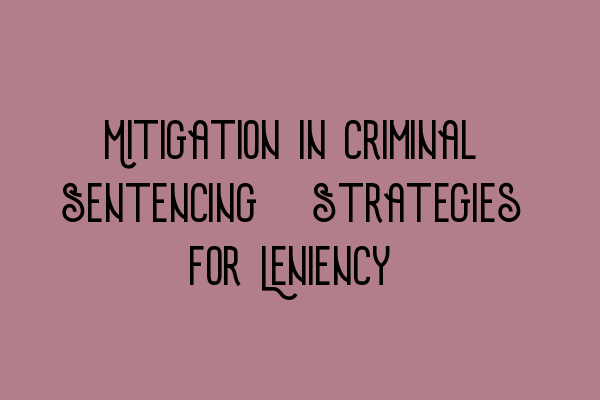Mitigation in Criminal Sentencing: Strategies for Leniency
At SQE Criminal Law & Practice Law UK, we understand that navigating the criminal justice system can be daunting. When facing criminal charges, it is crucial to have a solid mitigation strategy to help secure the most favorable sentence possible. In this article, we will explore various strategies for mitigation in criminal sentencing, providing you with valuable insights to support your case.
Understanding Mitigation
Mitigation refers to the act of presenting arguments and evidence to the court in order to persuade the judge to reduce the severity of the sentence. It provides an opportunity to show remorse, express rehabilitation efforts, and highlight extenuating circumstances that may have led to the offense.
Effective mitigation requires careful planning and consideration. By utilizing the right strategies, you can significantly increase your chances of obtaining a lenient sentence.
1. Preparation is Key
Before the sentencing hearing, it is essential to thoroughly prepare your mitigation case. Start by gathering all relevant documentation, such as character references, testimonials, and any evidence that supports your claims of remorse or rehabilitation.
Properly organizing this evidence will enable you to present a compelling case to the court, highlighting your individual circumstances and personal growth. Anticipate the prosecution’s arguments, and develop counterarguments that emphasize your efforts to make amends and reform.
By investing time in meticulous preparation, you demonstrate to the judge your commitment to rectifying and learning from your mistakes.
2. Show Genuine Remorse
An essential aspect of effective mitigation is demonstrating genuine remorse for your actions. Expressing regret and taking responsibility for the offense can have a significant impact on the judge’s perception of your character.
During the sentencing hearing, it is crucial to convey your remorse sincerely. By explaining the impact your actions have had on others and showing empathy, you can help the court understand the depth of your regret.
Additionally, consider seeking counseling or therapy to address any underlying issues that may have contributed to the offense. This proactive step can further demonstrate your commitment to personal growth and avoiding future criminal behavior.
3. Highlight Rehabilitation Efforts
Another effective strategy for mitigation is showcasing your efforts towards rehabilitation. This can include completing educational programs, seeking employment or vocational training, and participating in community service or volunteering activities.
By demonstrating your commitment to change and self-improvement, you provide evidence to the judge that you are actively working towards a law-abiding life. Emphasize the steps you have taken to address the root causes of your misconduct and present these efforts as a testament to your commitment to becoming a productive member of society.
4. Detailing Extenuating Circumstances
While not applicable in all cases, certain extenuating circumstances may have contributed to the commission of the offense. These circumstances can include factors such as mental health issues, addiction, or coercion.
It is crucial to provide the court with a detailed account of any extenuating circumstances that may have influenced your actions. This information can help the judge understand the context surrounding the offense and consider these factors when determining your sentence.
5. Seek Legal Representation
Given the complexities of the legal system and the high stakes involved in criminal sentencing, it is highly recommended to seek the assistance of an experienced criminal defense solicitor. A knowledgeable solicitor will have a deep understanding of mitigation strategies and can provide expert guidance tailored to your unique situation.
At SQE Criminal Law & Practice Law UK, we offer top-tier legal representation to clients facing criminal charges. Our team of solicitors is well-versed in mitigation techniques and can build a compelling case on your behalf.
For further information on SQE exams, law practice courses, and exam dates, please visit the following articles:
- SQE 1 Practice Exam Questions
- SQE 1 Practice Mocks FLK1 FLK2
- SQE 2 Preparation Courses
- SQE 1 Preparation Courses
- SRA SQE Exam Dates
Don’t face criminal sentencing alone. Contact SQE Criminal Law & Practice Law UK today to schedule a consultation with one of our experienced solicitors. We are dedicated to achieving the best possible outcome for your case.
